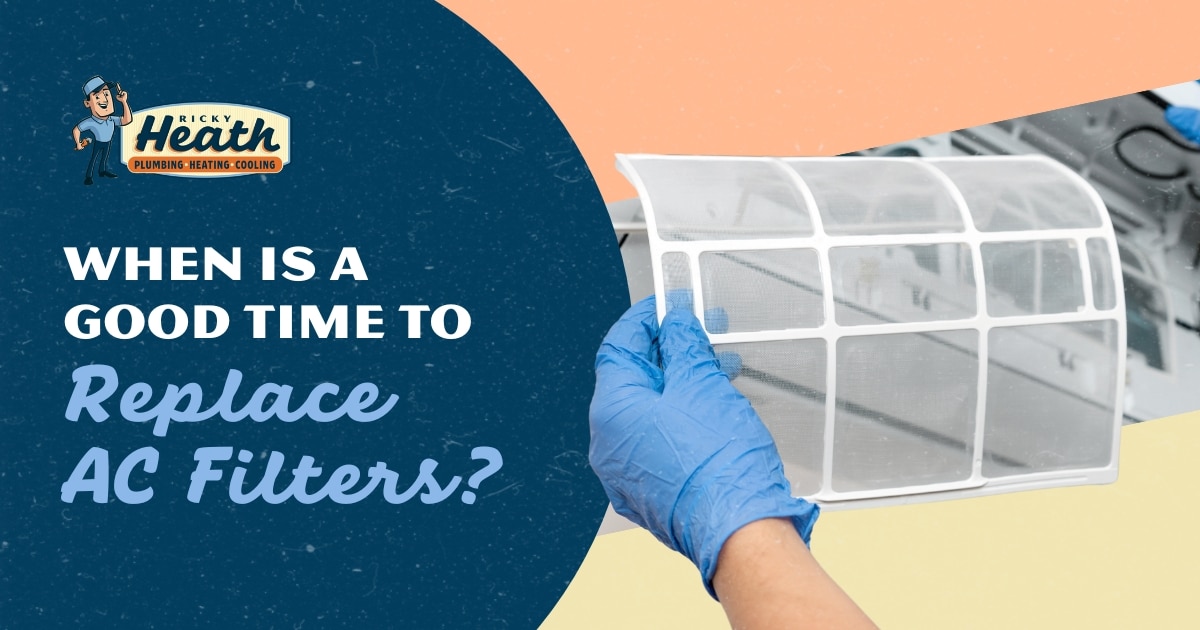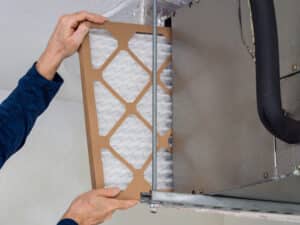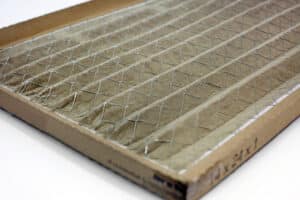
The climate of Macon, GA, consists of warm, rainy summers with “Second summers” that may stretch into October. Thanks to warm temperatures that continue for months, it’s important to understand the importance of proper AC filter replacement to keep your system running smoothly. The experts at Ricky Heath Plumbing, Heating, and Cooling have helpful tips and information about how often to replace your AC filter, signs that it needs changing, why filters are crucial for good HVAC system maintenance, and more.
Understanding the Importance of AC Filters

Before you learn more about how often or when to change your AC filter, it’s also beneficial to understand why these filters are so important. AC filters provide a wide variety of benefits for your home comfort system.
Filters improve air quality
AC filters are specifically designed to trap a range of tiny particles like dust, smoke, pollen, pet dander, and more. Since these filters remove airborne particles before they enter your home, you reap the benefits of healthy indoor air quality. Quality filters reduce allergens and pollutants to make your home as healthy as possible. People with allergies, asthma, or other respiratory conditions need clean, filtered air to help keep symptoms to a minimum.
Improves system efficiency
A clean air filter promotes good airflow, while a clogged and dirty filter restricts it. When airflow is restricted, it forces your AC to work harder to keep your home comfortable and could cause the system to overheat and shut off. However, clean filters support efficient airflow that reduces strain on your system, making it much more energy-efficient. Thanks to a system that runs as optimally as possible, you save money on monthly energy costs.
Extends system lifespan
A clogged AC filter causes dirt and debris to build up on major components, which also causes premature wear and tear. Keeping the filter clean helps to prevent this while also extending the lifespan of your system. With a clean filter, your AC requires fewer repairs and breakdowns that could cost you lots of money to remedy. Ignoring extreme issues might even force you to replace the entire system.
Signs It's Time to Replace Your AC Filter
Most air filters should be replaced every 30, 60, or 90 days, depending on the manufacturer’s instructions, but this may vary based on several factors. Now that you know the importance of a clean AC filter, here are some key signs your AC filter needs changing. Use these HVAC maintenance tips to help you recognize when to replace your filter to keep your system running efficiently:
- The filter is visibly dirty: Obvious signs of dirt, dust, and grime buildup on your air filter mean it’s time to replace it with a new one.
- High energy bills: If your monthly energy bills suddenly increase without a change in AC usage, it could mean that the air filter is dirty and needs to be replaced.
- Reduced airflow: Unusually low airflow from your vents or difficulties keeping your home cool may indicate that the AC filter is clogged and needs replacing.
- Musty odors or dust: An unpleasant musty odor or an unusual accumulation of dust on your furniture or from your vents are signs that the AC filter is dirty or clogged.
- Loud noises: Sudden loud noises coming from your AC out of nowhere might mean that the filter is clogged and should be replaced immediately.
- A reduction in air quality: If you suddenly notice an increase in respiratory-related symptoms and a reduction in indoor air quality, there’s a good chance that the culprit is a dirty air filter.
Types of AC Filters and Their Differences
Before you replace your filter, it’s important to consider which type is best for you and your system. To help you choose the right types of AC filters, here are their differences.
Fiberglass
Fiberglass AC filters are the least expensive option and are also disposable, making them a quick and cost-effective choice. These filters draw in air and trap particles using a woven fiberglass membrane. However, fiberglass filters aren’t as effective as some other filter styles since they don’t keep dust and smaller particles out of the air as well as other alternatives. If you or your family have respiratory issues, you may want to try an AC filter with a different material and a higher MERV rating.
Pleated
These air filters are the most popular choice for homeowners and feature cotton or polyester folds (or pleats) designed to trap airborne particles. They’re also disposable like fiberglass filters, but do a much better job of filtering tiny particulates like pollen, mold spores, and pet dander. If you have pets, a pleated AC filter with a MERV rating of around eight is a good choice.
HEPA
A high-efficiency particulate air (or HEPA) filter is recommended for those with allergies or other respiratory problems. These air filters cost more than pleated and fiberglass filters, but they can remove approximately 99.97% of particles, including dust, mold, pet dander, pollen, and even viruses and bacteria. A HEPA filter with a MERV rating of 11 or higher is an excellent choice if you suffer from allergies, asthma, or other respiratory issues and need the highest indoor air quality possible.
Electrostatic
Constructed of small cotton and paper fibers, electrostatic AC filters create static that attracts dust and airborne particles. When the particles reach the filter, they “stick” to it and get trapped, preventing them from spreading throughout the air in your home. Some of these filters are disposable, but others are washable and reusable. An electrostatic air filter could be a good option if you have mild allergies.
How a Dirty AC Filter Affects Your HVAC System

Regardless of the filter type, understanding the benefits of changing your AC filter is essential for good air conditioner maintenance. Here’s how a dirty filter affects your home’s HVAC system:
- Dirty filters restrict airflow and force your HVAC system to work harder, leading to costly breakdowns, decreased energy efficiency, or potential premature system failure.
- When your AC filter is dirty, excess particles enter the air inside your home, reducing the indoor air quality and exacerbating respiratory symptoms.
- A clogged or dirty air filter leads to grime buildup on important components, which eventually requires costly repairs.
- If your filter is dirty, your HVAC system can’t heat or cool your home as effectively as it should, leading to discomfort.
Get in Touch With Ricky Heath Today
Replacing your AC filter regularly is a smart way to extend your HVAC system's lifespan, prevent costly repairs, and ensure maximum energy efficiency. The Ricky Heath Plumbing, Heating, and Cooling team is available to assist you with all your home comfort needs in Macon, GA, and beyond. If you would like to schedule AC maintenance or another of our many reliable services, contact us today!